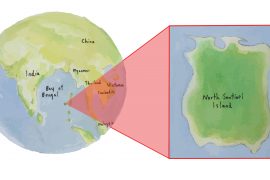By Vivian Veidt
On November 12, Portland State University hosted Making Oregon Count 2020, a day-long symposium of researchers, policymakers, and community census workers with the purpose of disseminating best practices in accurate census taking. Speakers from the U.S. Census Bureau and 23 other public and private organizations presented on topics ranging from outreach models to confidentiality, with several presenters addressing the threat of disinformation campaigns and disclosure avoidance based on misinformation. Oregon stands to gain a sixth seat in the U.S. House of Representatives if the 2020 Census indicates sufficient population growth. The likelihood of Oregon’s increased congressional presence makes the accuracy of the census more important to state government, but also increases the likelihood that disinformation campaigns may be used to artificially deflate Oregon’s population.
In a morning plenary (session of the conference), Former Director of the U.S. Census Bureau John H. Thompson described predicted disinformation campaigns as “imminent” and a threat to the mission of the census. Concerns about disinformation campaigns revolved primarily on participation by documented and undocumented non-citizens. The decennial census is a constitutional imperative that requires an accurate count of all citizens and non-citizens, regardless of status, residing in the United States. Population data collected by the census is used for allocating state and federal budgets, informing public service organizations, preparing emergency and disaster response, and establishing congressional districts.
Looming over the conference was heightened concern over disclosure avoidance in Hispanic and Latinx communities. In tandem with an aggressive deportation policy and increasing anti-immigrant rhetoric from conservative politicians, the Trump Administration sparked controversy and distrust following a 2018 attempt to include declarations of citizenship status on census forms for the first time since 1950. The proposed citizenship question was removed from drafts of 2020 Census forms following a June 2019 Supreme Court ruling rejecting the rationale for adding the question.
Lizette Escobedo of the National Association of Latino Elected and Appointed Officials (NALEO) Educational Fund reported that census officials estimated 6.5 million individuals would not have responded to the 2020 Census had the citizenship question appeared. In recent focus groups conducted by the NALEO Educational Fund, 78% of surveyed Latinx individuals indicated that a citizenship question would cause fear to participate and up to 50% of participants mistakenly believed that the citizenship question will appear on the 2020 Census questionnaire. Escobedo stressed during her speech that Title 13 of the U.S. Code prohibits dissemination of identifiable information gathered by the census to law enforcement, including ICE. NALEO has partnered with national and regional Spanish-language media outlets, including Univision, to accurately inform Latinx communities about the census and has established a bilingual hotline for questions and reporting fraud or disinformation. The bilingual hotline can be reached at 1-877-EL-CENSO (877-352-3676).
Aldo Solano, Census Project Manager for the Office of Gov. Brown described Oregon’s approach toward the threat of disinformation, particularly concerns that census data may be used to inform future ICE raids, as “not being the best role for the state to play,” citing distrust of government agencies. Instead, the State of Oregon has secured $7.5 Million for outreach using “trusted messengers.” “We’ve partnered with community-based organizations who serve primarily Latinx and other immigrant and refugee communities…” Solano explained, rationalizing that familiar groups and individuals will be most likely to encourage accurate participation in the census.
Threats to census accuracy are also prevalent in the LGBTQ+ community, with questions about partnership structures raising concerns about how collected data will be used amidst concerns that census data may be used to target individuals. Although Title 13 of the U.S. Code prohibits the release of identifiable individual or household information collected by the census, some speakers expressed concern that residents in same-sex relationships may avoid responding to the census or reporting their relationship status. Current drafts of the 2020 Census require respondents to describe intimate partnerships in terms of “Same-sex” or “Opposite-sex.” There is no question to identify the sexual orientation of respondents beyond that implied by the relationship question. Controversial proposed questions about sex designated at birth do not appear in current drafts of the 2020 Census, but the binary sex options printed in the current revision raise concerns about disclosure avoidance among non-binary respondents. The current question regarding respondents’ sex puts the census in conflict with states, districts, and territories that formally acknowledge non-binary individuals as distinct from the male and female options appearing on current drafts of the census questionaire. A questionnaire assistance hotline at 844-330-2020 will begin accepting calls on March 1, 2020—that hotline is in English, many other languages have hotline numbers available online at census.gov, the website also states that it is important not to call before March 1, 2020 as that will interfere with their testing of the system.
Of particular concern to Metropolitan Portland census-takers was the question of outreach to hard-to-count populations, including children under 5 years of age, college students, and individuals in the urban area who experience transience, homelessness, or housing instability. Census officials stress the importance of counting individuals only once and based on their location of primary residence. College students living in dormitories will receive invitations to self-report and dormitories may be visited by group-quarters outreach staff after the self-reporting period has concluded. 2020 will be the first year that internet reporting is available for the census.
An August 2019 report out of the Homelessness Research & Action Collaborative (HRAC) at Portland State University, estimated that over 38,000 people experienced homelessness at some point in calendar year 2017 in metropolitan Portland alone. According to Marc Czornij of the U.S. Census Bureau, the sizable homeless and transient population will be counted through Service Based Enumeration at shelters and partnered service providers like mobile food vans between March 30–31. Outreach teams will visit Targeted Non-Sheltered Outdoor Locations on April 1. During an afternoon presentation on homelessness and group-quarters enumeration, Czornij conceded in a later presentation that these methods may be inadequate to reach vulnerable individuals not involved with partnered service providers.
The 2020 Census is not adequately funded, Escobedo asserted. Escobedo cited the current funding gap for the U.S. Census Bureau at $2 Billion. Inadequate funding takes a particular toll particularly when it comes to efforts to support brick-and-mortar questionnaire assistance centers and outreach to non-respondents.
Additional concerns were echoed in the audience that ongoing impeachment proceedings may compromise the passage of spending bills on which the census depends.
Any significant undercounts around the country would not only jeopardize congressional redistricting in 2021, but also federal spending that could have negative effects on communities for a decade.





